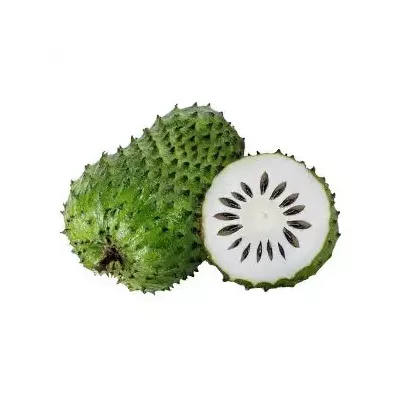



Sweet Mullatha, or Sweet Soursop, is a hybrid variety of Sousop or Mullatha that is sweeter than ordinary Soursop but has the same health benefits and medicinal properties. It belongs to the Annonaceae family, and the fruit pulp has a custard-like texture.

Pay using UPI, Card or Netbanking

Shipping within 3 working days
Annona muricata, commonly known as soursop, is a tropical tree species native to the Caribbean and Central and South America. Soursop in Hindi is called Hanuman Phal. The fruit is related to custard apple and the sugar apple. The appearance however, has a marked difference due to the presence of small spikes throughout its green outer skin. The white fleshy part and the seeds inside are similar to custard apple.
It has a green outer skin with small spikes throughout and a white fleshy part inside. In Malayalam it's called mullatha, which literally means custard apple with spikes.
Soursop has a slightly sour and sweet taste. When the fruit is ripe, it has a slightly pale yellow colour.
Soursop is a large fruit and usually weighs about 1 kg.
Soursop, as the name suggests, has a sour taste. However, the sweet hybrid variety is usually available in good nurseries. This variety is often called Sweet Mullatha or Sweet Soursop
Soursop is a small evergreen tree that can grow in full sun to partial shade. The tree may be grown in containers. Soursop or the Mullatha is easy to grow and doesn't require much care.
Plants from seedlings mature in 3–4 years. Grafted plants mature much earlier, as early as 18 months. Pest attacks are rare for soursop tree.
Eating soursop can be helpful for digestive problems. Some believe that the fruit and leaves of soursop have anti-inflammatory and anti-cancer properties. It's a good source of vitamin C and minerals such as potassium and calcium. However, the therapeutic effects of Soursop (Mullatha) aren't fully established.
Therapeutic use of the fruit has gained traction in recent years after some studies showed that certain compounds found in the fruit, annonaceous acetogenins and alkaloids, can inhibit the growth of cancer cells. However, these findings need to be further corroborated by more specialized studies and empirical evidence.
P.S. Anyone using Soursop/Mullatha juice, Soursop leaves, tea, or any other Soursop recipes for their anti-cancer properties is warned to follow proper medical advice and not discontinue their treatment prescribed by a qualified medical practitioner for a treatment using Soursop.
Data sheet